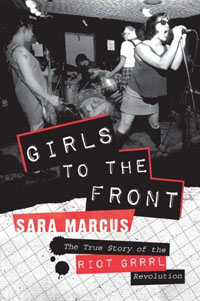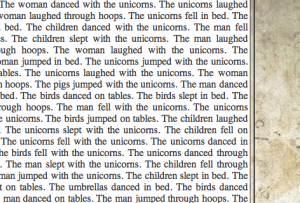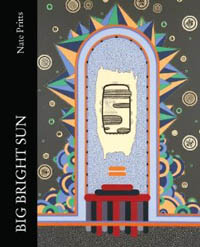Five, and quickly: interesting & only 9/11 piece I read this year, markedly good from Kier, again why I won’t read The Art of Fielding, the new vice.com’s Guide to Congo pt 1., and Schrödinger’s goddamn cat.
REVOLT, SHE SAID
 Where Art Belongs
Where Art Belongs
by Chris Kraus
Semiotexte, 2011
160 Pages / $13 Buy from MIT Press
&
Girls to the Front
by Sara Marcus
Harper Perennial, 2010
384 Pages / $15 Buy from Amazon
If you’re invested in the lives and work of girls as cultural agents, then you’ll like Sara Marcus’ Girls to the Front: The True Story of the Riot Grrrl Revolution and Chris Kraus’ Where Art Belongs. Like certain of my punk obsessed friends, my interest in bands like Bikini Kill and Bratmobile developed in high school during the late 90s. And by then the whole riot grrrl phenomenon in its original incarnation, with Kathleen Hanna front and center at the mic, was more or less dead. By the time I was introduced to Bikini Kill’s first album, the band had already released its final album Reject All American and played its final show in April 1997. Subsequent fans were left to speculate on both the political origins of the band and the interpersonal relationships that constituted riot grrrl as a living, breathing feminism.
September 19th, 2011 / 12:00 pm
Poetgramming
 I have been paying attention lately to the work of Adam Parrish, who teaches occasional courses on programming as it applies to creative writing at NYU. I have not taken this course, but would love to hear from anyone who has. I have been interested lately in the idea of using programming functions as aids to writing fiction and poetry. Some of my recent work has explored the aid of small scripts to randomize and change variables over constant frequencies.
I have been paying attention lately to the work of Adam Parrish, who teaches occasional courses on programming as it applies to creative writing at NYU. I have not taken this course, but would love to hear from anyone who has. I have been interested lately in the idea of using programming functions as aids to writing fiction and poetry. Some of my recent work has explored the aid of small scripts to randomize and change variables over constant frequencies.
A Kind of Weird Beauty: Michael Bible’s Simple Machines
 Michael Bible is the author of Cowboy Maloney’s Electric City, as well as the chapbooks Gorilla Math and My Second Best Bear Rug. He was winner of the ESPN: the Magazine/Stymie fiction prize. He lives in Oxford, Mississippi where he edits Kitty Snacks.
Michael Bible is the author of Cowboy Maloney’s Electric City, as well as the chapbooks Gorilla Math and My Second Best Bear Rug. He was winner of the ESPN: the Magazine/Stymie fiction prize. He lives in Oxford, Mississippi where he edits Kitty Snacks.
Michael Kimball: I’m curious: How did you get the title? That feels like it must have been a key to writing the piece.
Michael Bible: As far as Simple Machines goes, the title actually came to me after I wrote it, but you’re right, it sort of crystallized it for me. I started the manuscript after I read The Policeman’s Beard is Half Constructed and I was playing around with random sentence generators and ESL textbooks. I love sentences that are used as examples for school. (Has someone written a book of word problems? Also, that would be a good title. Probably somebody’s written it.) There is an oddness to those example sentences that I love, “bad” writing as “good” writing. They have a kind of weird beauty and they seemly have no context but somehow make stories anyway. Simple Machines is also something I learned about in school so it made sense that that would be a good title. READ MORE >
Sunday Service: Molly Brodak Poem
Hex
Gorges ago
in gymnasium-Church
under puff
of sleeve
in acid orange/
lavender/brown
& weak yellow
I felt punched
& sensed a new hollow
where a verse wormed:
He will spit you out
& the candy-bunny hollow
now punched
with He will spit you out
held hollows upon
hollows, cellless organs
& blank synapse billows
of He is not coming here
I am spit out after gorges of
gorges of minutes having
soft-snapped my tooth off
& held it all service
all heartless singing
all heartless repeating
held it under my tongue
finally spit from His mouth
the glassy hollow charm
& now feeling handless
& calm in gymnasium-Church
that one time only.
Molly Brodak is the author of A Little Middle of the Night (U of Iowa Press, 2010) and is the 2011-2013 Poetry Fellow at Emory University.
The site was slow, so I messed with some stuff and made it faster.
Also, I felt like giving Htmlgiant an animated glitter star background, so I gave Htmlgiant an animated glitter star background.
Enjoy this special enhancement!
UPDATE: Removed the animation. :(
Favorite Passages from Deleuze & Guattari’s What Is Philosophy? (In Chronological Order)
To criticize is only to establish that a concept vanishes when it is thrust into a new milieu, losing some of its components, or acquiring others that transform it. But those who criticize without creating, those who are content to defend the vanished concept without being able to give it the forces it needs to return to life, are the plague of philosophy.
There is such force in those unhinged works of Hölderlin, Kleist, Rimbaud, Mallarmé, Kafka, Michaux, Pessoa, Artaud, and many English and American novelists, from Melville to Lawrence or Miller, in which the reader discovers admiringly that they have written the novel of Spinozism. To be sure, they do not produce a syntheses of art and philosophy. They branch out and do not stop branching out. They are hybrid geniuses who neither erase nor cover over differences in kind, but, on the contrary, use all the resources of their “athleticism” to install themselves within this very difference, like acrobats torn apart in a perpetual show of strength.
If philosophy is paradoxical by nature, this is not because it sides with the least plausible opinion or because it maintains contradictory opinions but rather because it uses sentences of a standard language to express something that does not belong to the order of opinion or even of the proposition.
Philosophy thus lives in a permanent crisis. The plane takes effect through shocks, concepts proceed in bursts, and personae by spasms.
We do not lack communcation. On the contrary, we have too much of it. We lack creation. We lack resistance to the present. READ MORE >
An Excerpt from Jarett Kobek’s ATTA
New from Semiotext(e) is Jarett Kobek’s ATTA, “a fictionalized psychedelic biography of Mohamed Atta that circles around a simple question: what if 9/11 was as much a matter of architectural criticism as religious terrorism?”
He prepares himself, watches television, hopes the box displays violence. But television is coy, intimates killings as abstractions. Beatings, certainly, beatings and brutality. But minimal death. Always the moment after. Police crash into a room, find a body, hunt the killer. But the actual kill? Off-screen. Or with guns. And what can he learn from guns?
Atta opens a video rental account, chooses movies that help with knowledge of death. He rejects Hollywood fantasies, imperialist propaganda efforts, prefers outlandish tales of monstrous abuse. The Horror section. Blood explodes in these films, bright red replica splashes on skin. READ MORE >
Nate Pritts’s Big Bright Sun
 Big Bright Sun
Big Bright Sun
by Nate Pritts
BlazeVOX, 2010
100 pages / $16 Buy from Amazon
Nate Pritts’s Big Bright Sun celebrates witness, of one’s self and the self’s relationship to the world.
September 16th, 2011 / 11:00 am

